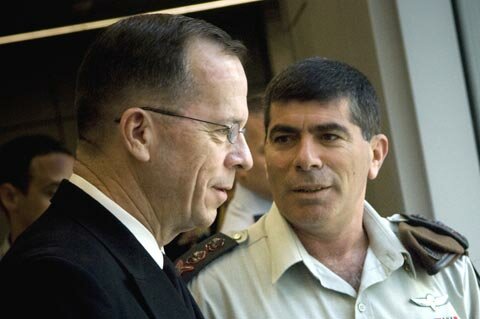
US Chairman of the Joint Chiefs of Staff Admiral Michael Mullen and IDF Chief of Staff Lt. Gen. Gabi Ashkenazi
Many senior military officials believe that Netanyahu and Barak prefer to remove anyone who might disagree with them on military policy. Ashkenazi is known to have close ties with Admiral Mike Mullen, the Chairman of the Joint Chiefs of Staff of the US Armed Forces, who made a brief unscheduled visit to Israel on Sunday. The apparent purpose of the visit, at least in part, was to gauge the mood in the country and make sure that Jerusalem is not planning to do anything wild in Iran.
IOA Editor: Unclear what the actual purpose of the reportedly “unscheduled visit” was. What if it was a planned visit to coordinate the timing of a joint US-Israeli attack on Iran? If so, “leaking” this sort of a statement would be the appropriate psywar. Anybody’s guess.
By Amos Harel, Haaretz – 28 June 2010
www.haaretz.com/print-edition/news/top-military-leadership-will-change-hands-within-six-months-1.298660
Military sources on Sunday blasted Prime Minister Benjamin Netanyahu and Defense Minister Ehud Barak for what they called a lack of long-term planning for the next round of senior defense appointments.
Netanyahu’s expected decision not to extend the term of Mossad chief Meir Dagan will create an extraordinary situation at the top of Israel’s defense establishment: Within a period of six months, starting in November, the entire senior security echelon, with the exception of Barak, will be replaced.
Those whose terms are set to expire, in addition to Dagan, are the Israel Defense Forces chief of staff; the directors of the Shin Bet security service and of Military Intelligence, of the four main IDF commands (northern, central, southern and home front ); and the deputy chief of staff.
The sources said that the failure of Netanyahu and Barak to lay the groundwork so that experienced candidates would be in line to step into these positions will leave Israel vulnerable as the successors transition into their new posts. They also said, however, that the outgoing figures themselves also deserve a share of the blame for failing to groom obvious successors.
Dagan is likely to step down as Mossad chief this fall. Shin Bet security service head Yuval Diskin is scheduled to leave in May 2011, after six years on the job. Israel Defense Forces Chief of Staff Lt. Gen. Gabi Ashkenazi will leave in February, after Barak decided not to extend his term by a fourth year. The tensions between the two both led to the defense minister’s decision and are responsible for the protracted delay of a round of promotions in in the General Staff.
The choice of the next chief of staff and the next Mossad and Shin Bet directors are, to some extent, interdependent, since one option is for one of the losing candidates for the top IDF job to be appointed to head the Mossad or the Shin Bet. In the past year, Diskin’s name has come up as a successor to Dagan. The order in which the top positions are filled (first the Mossad director, then the chief of staff and finally the Shin Bet director ) could affect the choices as well as the timing of the appointments.
In the past two years relations between Ashkenazi and Dagan have fluctuated, with interpersonal tension that began with the IDF and the Mossad blaming each other over a military scandal. Later, the pair found themselves allied over Iran’s nuclear program, siding with the moderate voices in Jerusalem regarding Israeli policy toward Iran. But the recent raid by the Israel Navy of the Turkish flotilla off the coast of Gaza created new tension between Ashkenazi and Dagan, with IDF officials claiming that the Mossad failed to provide additional early intelligence that could have shed light on the plans of the flotilla organizers.
Now it seems that Ashkenazi and Dagan have found common ground over what they perceive as snubs from the political leadership. Both have considerable experience, both hoped to keep their positions for another year and both will be removed by Netanyahu and Barak, who are tightly coordinating their actions. Aside from the personality conflicts, the changing of the guard takes on added importance given the urgency of the Iran issue.
Many senior military officials believe that Netanyahu and Barak minister prefer to remove anyone who might disagree with them on military policy.
Ashkenazi is known to have close ties with Admiral Mike Mullen, the Chairman of the Joint Chiefs of Staff of the US Armed Forces, who made a brief unscheduled visit to Israel on Sunday. The apparent purpose of the visit, at least in part, was to gauge the mood in the country and make sure that Jerusalem is not planning to do anything wild in Iran.
























